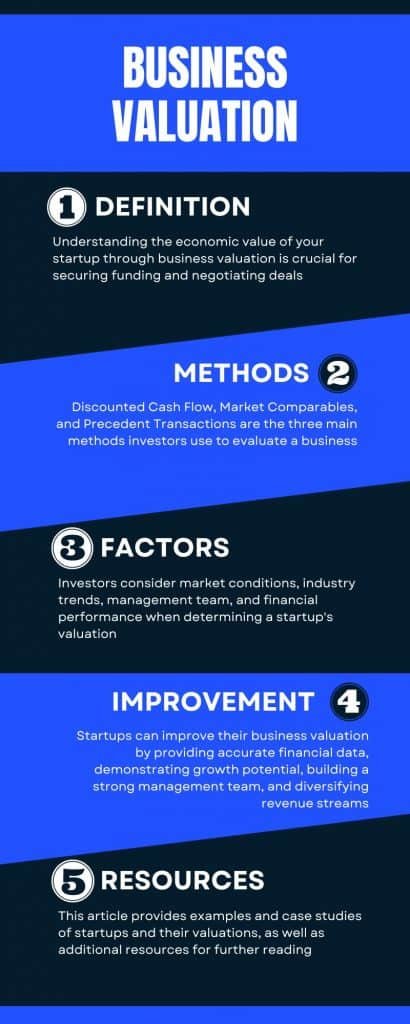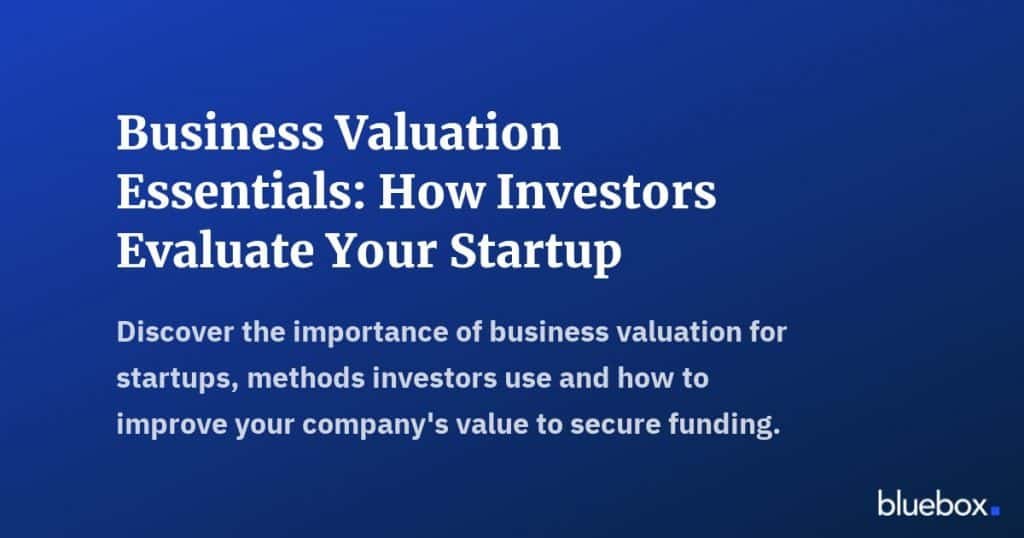
As a startup founder in Singapore, understanding the intricacies of business valuation is crucial when seeking investment. This article aims to provide an insight into the importance of business valuation, its role in determining the worth of a startup, and how investors evaluate businesses. We’ll also discuss how startups can improve their business valuation and appeal to investors.
Why is Business Valuation Important for Startups?
Startup valuation is a critical aspect of the fundraising process. It determines the worth of your business in the eyes of investors and helps them decide whether or not to invest in your company. As Warren Buffet once said, “Price is what you pay. Value is what you get.” Understanding your startup’s value will enable you to negotiate better deals and secure the funding you need to grow and succeed.
What is Business Valuation?
Business valuation is the process of estimating the economic value of a company. It helps investors determine the worth of a startup and make informed decisions on whether to invest in it. According to Aswath Damodaran, Professor of Finance at the Stern School of Business at New York University, “Valuation is not an exact science, but a range of possible values.” This means that different investors may have different opinions on the value of a startup, based on their analysis and perspectives.
Methods Used by Investors to Evaluate a Business
Investors typically use three main methods to evaluate a business:
1. Discounted Cash Flow (DCF)
DCF is a widely used method that involves estimating the future cash flows a company will generate and discounting them back to their present value using a discount rate. The discount rate represents the perceived riskiness of the investment. According to McKinsey & Company, “The DCF method is particularly useful for valuing companies with a stable and predictable cash flow.”
2. Market Comparables
This method involves comparing the startup to similar companies (in terms of size, industry, and growth stage) that have recently been valued or sold. Investors use financial metrics such as revenue, earnings, or user base to derive a valuation multiple, which is then applied to the startup’s financials.
3. Precedent Transactions
This method analyzes the acquisition price of similar companies in the past to estimate the value of the startup. It takes into account factors such as deal structure, market conditions, and strategic fit. EY states that.
Factors Influencing Business Valuation
Several factors influence business valuation, including:
- Market conditions: Investor sentiment, economic outlook, and industry trends can all impact a startup’s valuation.
- Industry trends: The attractiveness of the industry in which the startup operates plays a crucial role in determining its value.
- Management team: The experience, skills, and track record of the startup’s management team can significantly impact its valuation.
Financial performance: The startup’s historical and projected financial performance, including revenue, profitability, and growth rates, are important factors that investors consider when determining its value.
By understanding these factors and their impact on your startup’s valuation, you can better position your company to attract investment.
How Startups Can Improve Their Business Valuation
Here are some strategies startups can employ to improve their business valuation and appeal to investors:
- Develop a strong business plan: A well-crafted business plan demonstrates your startup’s potential and shows investors that you have a clear roadmap for growth and success.
- Demonstrate consistent growth: Showing a track record of consistent revenue and customer growth can boost investor confidence in your startup’s ability to scale and generate returns.
- Maintain accurate financial records: Accurate and transparent financial records are essential for investors to assess your startup’s performance and make informed decisions about its valuation.
- Build a solid management team: Assembling a team with diverse skills, experience, and a proven track record in the industry can strengthen your startup’s valuation.
- Foster strategic partnerships: Establishing strategic partnerships with reputable companies or industry leaders can enhance your startup’s credibility and increase its perceived value.
Examples and Case Studies of Startups and Their Business Valuations
| Startup | Industry | Valuation Method | Valuation |
|---|---|---|---|
| Startup A | Fintech | Market Comparables | $25M |
| Startup B | Healthtech | DCF | $15M |
| Startup C | E-commerce | Precedent Transactions | $50M |
*Note: These examples are for illustrative purposes only and do not represent actual startup valuations.
In conclusion, understanding the concept of business valuation and its role in helping investors determine the worth of a startup is crucial for founders seeking investment. By familiarizing yourself with the main methods used by investors to evaluate a business and the factors that influence valuation, you can better position your startup to attract the funding it needs to grow and succeed.
Remember, while securing investment is an essential step in your startup’s journey, the true value of your company lies in its ability to solve problems, create value for customers, and generate sustainable growth. Stay focused on these aspects, and success will follow.
Additional Resources
Here is a list of resources to help you learn more about business valuation and its importance for startups:
- Investopedia: Business Valuation – A comprehensive guide covering the basics of business valuation, its methods, and its significance in the investment process.
- Forbes: How Startup Valuations Are Determined – An insightful article discussing the factors that influence startup valuations and the methods investors use to determine them.
- Entrepreneur: The Basics of Valuing a Startup – A practical guide on the fundamentals of startup valuation, including tips on how to improve your company’s worth.
- Startup Grind: The Art & Science of Startup Valuation – A detailed analysis of the various aspects of startup valuation, including the challenges and best practices involved.
- Inc.: 5 Tips for Maximizing Your Startup’s Valuation – A helpful guide providing actionable tips for increasing your startup’s valuation and attracting investment.
TL;DR
| Topic | Key Points |
|---|---|
| Importance of Business Valuation | Determines the worth of a startup, helps secure funding, and aids in negotiations |
| Business Valuation Methods | Discounted Cash Flow (DCF), Market Comparables, Precedent Transactions |
| Factors Influencing Valuation | Market conditions, industry trends, management team, financial performance |
| Improving Business Valuation | Develop a strong business plan, demonstrate consistent growth, maintain accurate financial records, build a solid management team, foster strategic partnerships |
